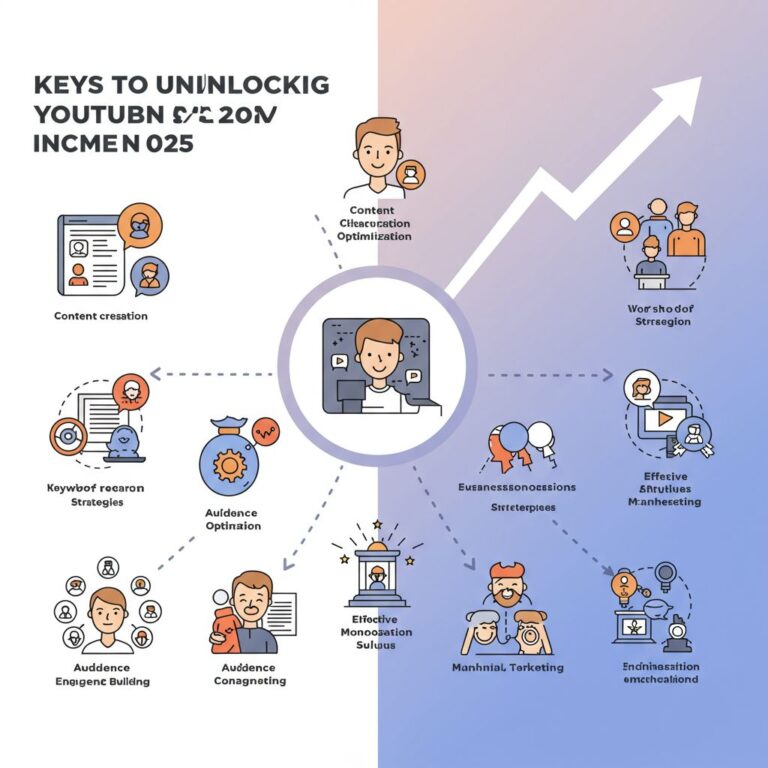Table of Contents
Introduction
In the ever-evolving landscape of digital marketing, mastering the art of SEO is crucial for anyone looking to achieve online success. Search Engine Optimization (SEO) is not just about getting your website to rank higher in search engine results; it’s about enhancing the overall user experience on your website, understanding your audience, and delivering valuable content that meets their needs.
This article delves into comprehensive SEO strategies, providing you with the knowledge and tools required to excel in the digital marketplace. By the end of this guide, you should possess a strong understanding of SEO fundamentals and be ready to implement effective strategies that will unlock digital success.
Understanding SEO: The Basics
SEO involves optimizing your online content so that a search engine likes to show it as a top result for searches of specific keywords. Let’s break it down further into essential components:
- Keyword Research: Discover what your audience is searching for and tailor your content to meet their queries. Use tools like Google Keyword Planner, SEMrush, or Ahrefs to identify high-ranking keywords in your industry.
- On-Page SEO: Involves optimizing individual web pages. Factors include using keywords effectively, creating engaging and relevant content, optimizing title tags and meta descriptions, and using header tags to structure your content.
- Off-Page SEO: Refers to actions taken outside of your website to impact your rankings within search engine results pages (SERPs). This includes backlinking, social media marketing, and influencer engagement.
Implementing Keyword Research
Keyword research is the foundation of any successful SEO strategy. Start by brainstorming a list of topics relevant to your business and then expand this list by using keyword research tools. Aim for a mix of short-tail (head) and long-tail keywords. Long-tail keywords may have lower search volume but often have higher conversion rates as they capture specific search intent.
Building an Effective Content Strategy
A successful content strategy is the cornerstone of SEO success. Here’s how you can create a strategy that not only attracts but also engages your target audience:
- Create Quality Content: Quality content is informative, actionable, and relevant. It answers a question or solves a problem and meets the search intent of your users.
- Utilize Multimedia: Incorporate images, videos, infographics, and interactive elements to enhance engagement and the shareability of your content.
- Regularly Update Your Content: Keep your content fresh and updated to maintain relevance and authority in your niche. This signals search engines that your website is current and active.
The Role of User Experience in SEO
Beyond content, optimizing the user experience (UX) is crucial. A well-designed website that offers fast loading times, mobile-friendly interfaces, and intuitive navigation enhances user satisfaction and reduces bounce rates, indirectly boosting SEO rankings. Ensuring accessibility for all users, including those with disabilities, is also essential and reflects positively on your site’s overall user experience.
The Power of Link-Building
Link-building remains a vital part of your SEO strategy. Links are a significant factor in the search engine algorithms. Here’s what you need to know:
Link-building involves earning backlinks from high-quality, authoritative sites. These links act as a vote of confidence and can substantially increase your site’s authority and search rankings. Ensure your backlinks come from varied, relevant, and authoritative sources within your industry.
Remember, link-building is not just about the quantity but also the quality of the links. Engage in genuine partnerships, guest blogging opportunities, and contribute high-value content to relevant forums and networks.
Strategies for Effective Link-Building
Effective link-building requires creativity and patience. Consider creating linkable assets, such as comprehensive guides, unique studies, or interactive tools. These resources naturally attract backlinks over time. Additionally, regularly auditing your existing backlinks can identify opportunities to update outdated links or disavow harmful ones, further strengthening your site’s link profile.
Measuring SEO Success
Measuring the success of your SEO efforts is crucial to understand what is working and where improvements can be made. Use the following tools and metrics to gauge your SEO performance:
- Google Analytics: This tool offers detailed insights into your traffic, audience behavior, and conversion rates, helping you understand the ROI of your SEO efforts.
- Google Search Console: Monitor your website’s presence in Google search results and identify any issues that may be affecting your performance.
- SEO Audits: Conduct regular audits to ensure your website complies with SEO best practices and standards. Look for issues like broken links, duplicate content, and site speed.
Understanding Analytics and Reporting
Beyond just collecting data, it’s vital to interpret results correctly. Utilize dashboard tools like Google Data Studio for visualization. Translate data into actionable insights for decision-making. Regular reporting helps in spotting trends, gauging the effectiveness of campaigns, and adjusting strategies accordingly.
FAQ
Question 1: What is the importance of SEO in digital marketing?
Answer 1: SEO is vital in digital marketing as it improves the visibility of a business’ website on search engines, thereby driving more organic (non-paid) traffic to the site. This can lead to increased leads, sales, and revenue. SEO is also instrumental in establishing brand credibility and trust, which can result in long-term customer relationships.
Question 2: How long does it take to see results from SEO?
Answer 2: SEO is a long-term investment, and results are typically seen within 3 to 6 months. However, this can vary depending on the competitiveness of the industry and the quality of the SEO practices implemented. Continuous optimization and content adjustment based on analytics are crucial for sustaining SEO gains over time.
Question 3: Can social media impact SEO?
Answer 3: While social media doesn’t directly affect SEO rankings, it does influence your SEO efforts. Social media can drive traffic to your site, increase your content’s exposure, and indirectly create backlinks. Engaging with your audience on social platforms encourages sharing and discussions, enhancing brand visibility and authority.
Conclusion
Mastering SEO is an ongoing journey, not a one-time task. It requires dedication, continual learning, and adaptation to the latest digital marketing trends and search engine algorithms. By investing in effective SEO strategies, you’ll not only improve your website’s rankings but also enrich user experience, build stronger customer relationships, and ultimately, achieve unparalleled digital success. Take what you’ve learned here and start implementing changes today, setting your brand up for a thriving online presence.









